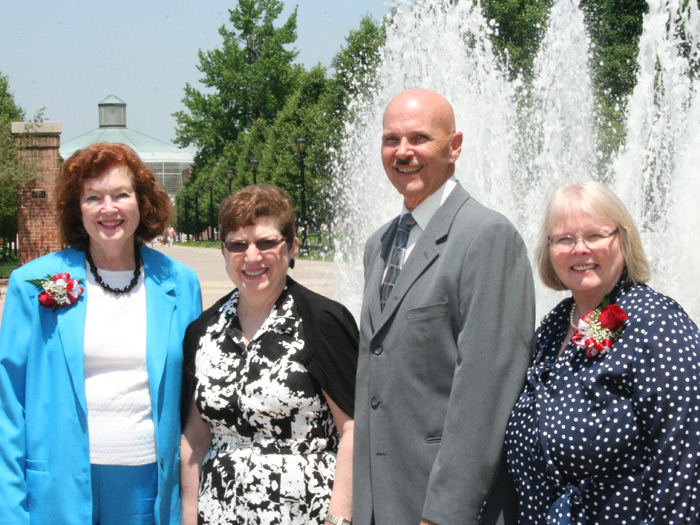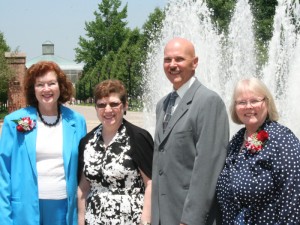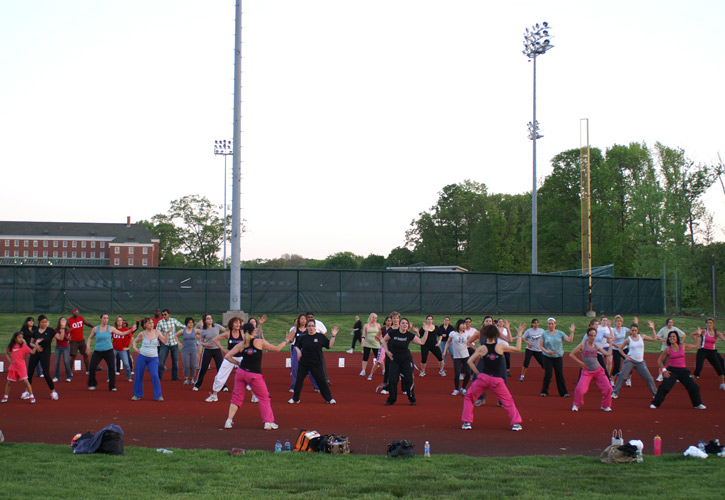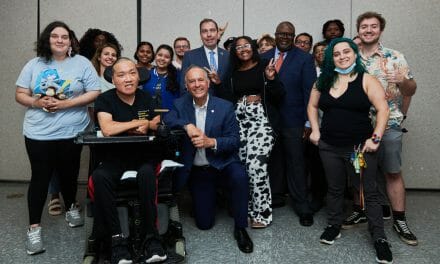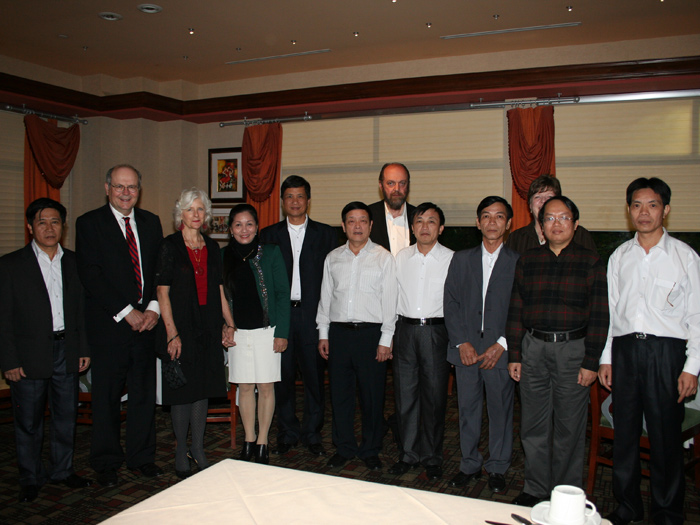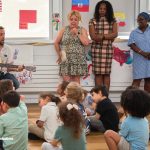Two representatives from the Brooklyn Home For Aged Men, George C. Schaefer, Vice President and Treasurer, and Annette E. Schaefer, Director, recently visited the College of Staten Island (CSI) to enjoy lunch and hear reports from some of the faculty members who have benefited from their generous contributions to the College over the years, a total of $534,750 to date. The academic areas represented were geriatric nursing, Alzheimer’s disease research, and breast cancer research.
Prior to the event, George Schaefer, explained his organization’s philanthropic track record at CSI. “We were approached to offer a scholarship for geriatric nursing. I wasn’t sure how everybody would feel about it, but then it ended up before the board. Low and behold, one of our board members was a graduate of the Nursing program here and had nothing but good things to say. We started with a small scholarship stipend and we did that a couple of times. We were then made aware of a matching funds grant from the federal government and decided that that would be appropriate. We honored our president with an endowment that was matched by the federal government. The following year I decided that other members of the board should be honored and we established eight separate scholarships for students that were matched by the federal government. Last year, we received applications for grants for Alzheimer’s research, breast cancer awareness research, and a laboratory for nurses studying gerontology. We thought that each one was appropriate and we funded them…”
Attacking Alzheimer’s Disease
Dr. Alejandra del Carmen Alonso, Associate Professor of Biology at CSI, who is conducting Alzheimer’s disease research with an undergraduate and a graduate student, thanks to a grant from the Brooklyn Home, made a short presentation on her research, which involves, among other living models, a biologically engineered mouse that is the only one of its kind.
“What we are doing,” Alonso explained, “is trying to identify the causes of Alzheimer’s disease. We are generating different models systems, such as cell culture, transgenic Drosophila (fruit flies) and mice with the students to mimic the process of neuronal degeneration so we can understand the mechanism of neuronal degeneration. We are trying to reproduce what happens in the affected neurons of a brain with Alzheimer’s disease. What happens from the very beginning is that the neurons lose connections with other neurons, and they start deteriorating with time, so we’re trying to reproduce that in a model.”
Alonso added, “This research is very important for CSI and the whole society because Alzheimer’s disease is becoming an epidemic that is going to cause the health system to become bankrupt in the future if we don’t do anything to stop this disease. We are working to discover the mechanism by which the neurons of Alzheimer disease patients lose their function. If we can understand the mechanism, we can identify the targets to stop this disease. The Brooklyn Home is supporting us and that is very important because we can finance undergrad and graduate students working in the lab. Giving undergrads the opportunity of doing research, we are stimulating a new generation of researchers to dedicate their efforts to this devastating disease. The more we invest in research in neurodegenerative diseases, the more we can have hope that we will get to solve the disease. In turn, it helps the elderly population, as prevalence of the disease increases.”
Raising Breast Cancer Awareness
The next presenter at the breakfast was Donna Gerstle, Director of the Staten Island Breast Cancer Initiative. She emphasized that the incidence of breast cancer on Staten Island is larger, on average, that that of the other four NYC boroughs, higher than the rate within New York State, and the highest in the nation. Gerstle explained how funds from the Brooklyn Home have given the Initiative the opportunity to battle the disease on a number of fronts. “It is a three-fold project,” she noted. “The first was to look at women over the age of 65 and their compliance with mammography as well as their incidence and death from breast cancer throughout the five boroughs. The second was to look at various environmental sites throughout New York City and to map those sites. Finally the last, and probably the most important, was to go into nursing homes on Staten Island and to teach women about breast health, compliance at age 65 and older, and to teach them how to do self-exams.”
Regarding the grant, Gerstle commented, “Having private support and being able to support undergraduate and graduate students–to give them the Staten Island community and all New York City females as their laboratory–provides [students with] opportunities they would not have with normal grants.”
The Future of Geriatric Nursing
The next speaker was Mary O’Donnell, Chair of the Nursing Department, who stated that “the geriatric population has grown tremendously and is expected to grow, I believe, four-fold by 2040. Most older people need to be cared for as they age. They are health consumers.” O’Donnell mentioned that, thanks to the Brooklyn Home, the Department was able to provide scholarships to 11 nursing students over the past year. There is another initiative, however, that the Brooklyn Home is funding, the Center for the Education of Nurses in the Care of Older Adults (CENCOA). When it is completed this fall, CENCOA will provide a realistic, but nonthreatening, environment for nursing students along the academic spectrum from the associate’s to the master’s level, to participate in scenarios in a model of an assisted living apartment with mannequins that have vital signs. As students encounter these scenarios, they are videotaped so that they can critique their own performances in tandem with an evaluation from a faculty member.
“This Center was developed,” O’Donnell said, “because students usually don’t get enough exposure to the care of older adults in the home, and most seniors prefer to be cared for in the home, and it’s more cost-effective.” In addition, O’Donnell noted that CENCOA will prepare nursing students for jobs caring for patients in their homes.
Arlene Farren, Associate Professor of Nursing at the College, concluded the presentation by providing the Schaefers with some more detailed information about the inner workings of CENCOA.
Following the lunch, the Schaefers attended the Spring Pinning ceremony for AAS degree recipients.

